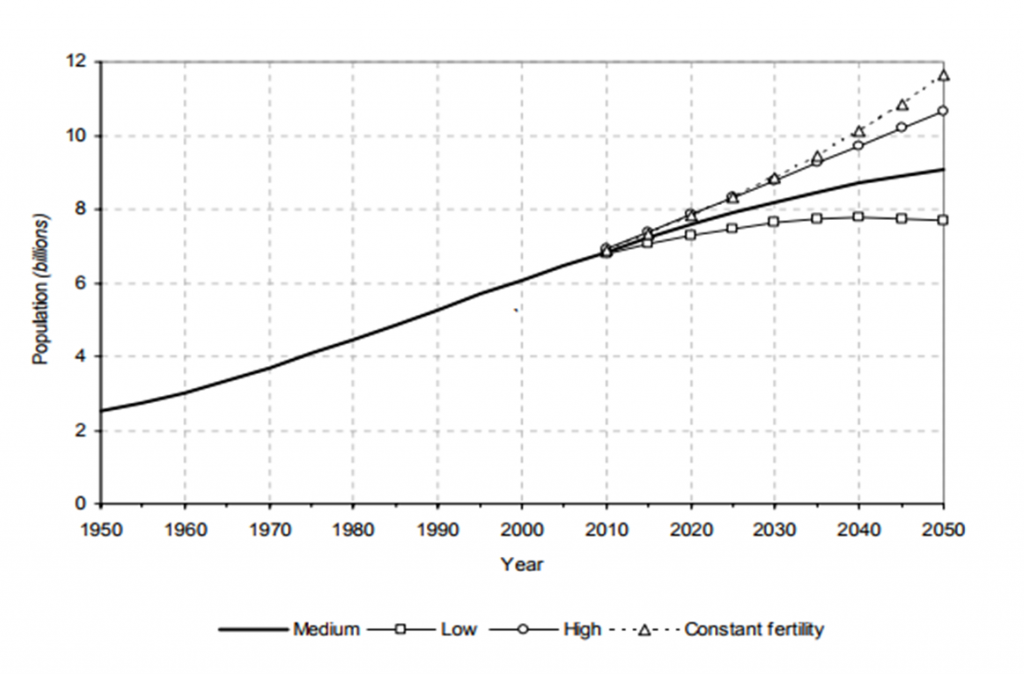World Population – Challenge or Crisis?
by Pete Moore
The population of human beings is increasing. In 2000 there were 8 billion, by 2006 this had risen to 6.5 billion and, unless death-rates rise catastrophically, the United Nations predicts that by 2050 this figure will have risen to 9 billion. Is this an outworking of God’s command to go into all parts of the world and multiply, or is it a reflection of a ‘fallen’ world in which humanity keeps living beyond God-given guidelines and boundaries?
Each year the human population increases by 79 million people – around 58 million people die, but 137 million babies are born. If we plan to house, feed and provide infrastructure for these people, we currently need to build the equivalent of a new city the size of Birmingham or San Francisco every 5 days, or more than a new UK every year.
Quite how long this growth will continue is difficult to predict. Currently the average woman has 2.6 children. If this continued unchanged there would be just over 11.5 billion people by 2050. The United Nations, however, thinks rates will fall and have calculated three possible options; high, medium and low variant models, that chart the population with a birth rate of 2.5, 2.0 and 1.5 children per woman respectively. These predict a global population on fifty years time of between 7.7 billion and 10.6 billion people.1 (see Graph 1).
After that most experts believe it will either stabilise around 9 billion, or start to decrease.2
A major driving force behind the current rate of growth is the fact that tomorrow’s parents are already born. While the birth rate per woman is declining, there is a demographic ‘bulge’ of women of child-bearing age. According to the UN Population Fund, in 2006 about half of the world’s people are under the age of 25, which includes 1.2 billion people between the ages of 10 and 19.3
New crisis or old story?
Anxiety about population growth is not new. In the second century AD Roman lawyer and church writer Tertullian wrote ‘Our numbers are burdensome to the world, which can hardly support us.’4 Two hundred years later Greek-born priest St Jerome wrote; ‘the world is already full, and the population too large for the soil.’5
Some say that people have always panicked about population, but humans have a remarkable ability to solve problems. If the population grows, so too will our drive to find solutions.
The counter argument is that 21st century science and technology gives us a much greater ability than in earlier centuries to calculate the scale of the Earth’s resources: and to predict not only rates of growth, but also the ultimate limits, for long-term sustainability.
Problem – what problem?
Not everyone is worried. Some welcome expanding human numbers, arguing that, throughout history, the challenge of population growth has stimulated development, Christians who take this view point to passages in Genesis, where God tells the first human beings to be fruitful and multiply, reiterated when Noah and his family left the Ark.6 When speaking to Abraham, God indicates that large families are a sign of his blessing, saying ‘I will confirm my covenant between me and you and will greatly increase your numbers.’7 And later God tells Abraham, ‘I will surely bless you and make your descendants as numerous as the starts in the sky and as the sand on the seashore.’8
Other Christians say you cannot infer hard science about population growth from texts that use such artistic language – there are, after all, about one billion grains per cubic metre of sand. They also remind us of God’s requirement for humanity to tend and care for the earth,9 which is very different from being so fruitful and multiplying so much that we over-exploit the planet. Jesus neither married nor had children, and Paul felt a single life was the best way to serve God.10 Hence having few or no children is not necessarily wrong in God’s eyes.
Those aguing in favour of increasing populations say that each generation inherits knowledge and understanding from its elders and then adds to it. By this argument, humanity moves forward most strongly when the maximum number of people are educated so as to contribute to human achievement.
Read more: World Population – Challenge or Crisis? (Part 2)
References
- UN World Population Prospects 2004, Revision Feb 2005.http://esa.un.org/unpp/
- Dyson T.World Population to 2300. United Nations Department of Economic and Social Affairs/Population Division.
2004 - www.unfpa.org/swp/2005/english/ch5
- Tertulian.De Anima: A Tradition on the Soul. Cited in: Love your unborn neighbour. 1994. London: SPUC.
p35. - Jerome. The Principle Works. Cited in: Love your unborn neighbour. 1994. London: SPUC.
p35. - Genesis 1:28 and 9:7
- Genesis 17:2
- Genesis 22:17
- Genesis 2:15
- 1 Corinthians 7:8
Christian Medical Fellowship (CMF) Files No. 33, 2006

